- Home
- Alice Walker
We Are the Ones We Have Been Waiting For Page 10
We Are the Ones We Have Been Waiting For Read online
Page 10
As Americans we have a rich history of both heroes and villains. If we cultivate the compassionate understanding that even the “worst” people are undoubtedly doing the best that they know, and that this “knowing” is often sourced by ignorance, suffering and fear, we can learn from them all.
In this time, which the medieval prophet Nostradamus predicted as a period of unparalleled violence and war (lasting twenty-seven years), a time that would see much of the Earth destroyed by war, we can set our personal intention on peace, in whatever situation we find ourselves; that small contribution can be our thanks for all that we, as “lucky” Americans, have enjoyed.
* To his credit, my fellow Georgian, former president Jimmy Carter, visited Cuba and Fidel Castro a few weeks after this talk.
* I am not sure where I first read the story of Saartjie Baartman. Perhaps in one of the books on African American history by J. A. Rodgers. There have been many conflicting reports about her and her remains. In one story I read years ago, her remains were in a jar on a shelf in a storeroom of the Louvre. Hence my mention of the Louvre in my talk. Having been “discovered,” they were about to be sent home to southern Africa. In a current newspaper article, however, it was stated that the remains, now including not only the vulva but other “parts” of the body as well, have been stored at the Museum of Man, in Paris, and that only now—May of 2002—are they being sent back to Africa. The “husband” from earlier reports has now become a “doctor.” There is no mention of a child. Saartjie Baartman belonged to the Khoisan people, who are said to closely resemble our original ancestors.
* The archaic meaning of “romance” is “wisdom tale.”
8.
Now that You Are with Me Like My People and The Dignity of the World
Letters of Love & Hope
The Story of the Cuban Five
The story of the Cuban Five is one of courage, great sacrifice, and love. It is a story for the ages; especially for those of our people who have suffered under the implacable oppression of white American supremacy; a rule of color and power the rest of the world appears destined to experience. In September of 1998 five Cuban men, Gerardo Hernández Nordelo, Ramón Labañino Salazar, Antonio Guerrero Rodríguez, Fernando González Llort, and René González Schwerert, were arrested in Florida. Charged with espionage and other “crimes” against the United States, they were convicted in Miami, a place notorious for its hatred of the Cuban revolution, Fidel Castro, and all things relevant to the social, cultural and spiritual aspirations of the Cuban people. The five men were treated atrociously, as Cubans routinely have been and darker-skinned Cubans even more so, in prisons in the United States. Although judges were unable to define a specific “crime” the five had committed, beyond attempting to discover and alert their country of planned terrorist attacks—which Cuba has suffered for decades from Miami-based Cubans backed by the United States government—they were treated sadistically: denied the right to bail, separated from their families, and kept for seventeen months in solitary confinement in an attempt to break their bodies and their spirits. They were given ridiculously long sentences: one of them, Gerardo Hernández Nordelo, was given two life sentences, plus. And there are other horrors that the men in these pages refrain from describing out of compassion for their families and the people of Cuba who suffer intensely from their plight.
The treatment they have received is shameful. The silence around this treatment even more so. Where are the Congress members, the senators and representatives, we should be able to rely on in cases such as this? People with the courage to insist that prisoners not be subjected to torture. That their children not be denied access to them, that their wives and mothers not be driven to despair by the many failed attempts they make to see their incarcerated kin—wrongly incarcerated, in this case. Unfortunately, many of our leaders seem to view Florida’s Cuban conservatives, including the assassins and terrorists among them, as People Who Vote. It appears they will endure any degree of inhumanity against any number of babies, children, old grand-aunts and nursing mothers, grandfathers and soccer players, if they can secure the collective vote from this terrifying electorate.
Fortunately, my introduction to Letters of Love & Hope: The Story of the Cuban Five is not about the painful failings of our leaders. Who never seem to realize how we, who vote for them, also suffer, when they do nothing; as good people, like the Cuban Five, whose behavior we can completely understand, are crucified for trying to prevent destruction of human life.
What floated up to consciousness for me as I read these letters back and forth between incarcerated fathers, sons, husbands; and wives, children, and mothers attempting desperately to reconnect, was a realization of how old this story really is. When I read these letters and poems and viewed the drawings, I was connected to those of our ancestors who first experienced the wrenching devastation of the destruction of their families. I felt in my own body the long centuries of slavery, of the systematic—and to our ancestors, insane—focus of the slave-owners on tearing families apart. How courageously so many of our ancestors must have defended, or tried to defend, this precious unit, the family. How many centuries it must have taken to almost conquer familial devotion. For some of our ancestors the voiding of familial feeling was achieved. They became zombies who learned to help their masters subdue and destroy others who were enslaved. Their descendents are those today who sell, within as well as without their families of birth, crack cocaine and other addictive drugs. They are also the allies of those in power, aiding and abetting the squashing of all rebellious, “disobedient” life.
There are fathers among the hundreds of thousands in jail in the United States, and a huge number of mothers as well. What is happening to their children, who frequently follow their parents into a lifetime of encounters with police power, humiliation, loss of contact with society, incarceration? How defenseless these children are, and how robbed of the love and guidance that should be every child’s birthright.
When I was asked to write an introduction to this book I had no idea how it would speak to me. I was attending the 2004 International Book Fair in Havana; my own book Meridian had been translated into Spanish and presented. I flew in for the occasion and found that Cuba now has a 100-percent literacy rate. It was amazing to see the hundreds of children, mothers, fathers, grandparents, everyone it seemed, rushing to the book fair on foot. The fair itself was held in what used to be a fort. The room in which my book was presented and, afterward, a dialogue convened, was just behind what had been the office of Che Guevara during his lifetime. A bronze bust of him graces the foyer. As I was being interviewed I stroked his metal locks, amused, as I think he would have been, that so fluid a spirit had been memorialized in such a monument. To me, Che continues to have a numinousness, a radiance, that means, I think, that he will be remembered, and used as a guide, for many generations to come. His example of how to live and die certainly must be part of the nourishment that sustains Los Cincos, as the Cuban Five are affectionately called.
As determined as they were to bring Elián González home; that is how determined every Cuban I spoke with seemed to be on freeing the Cuban Five. There was not a single conversation that did not end on their situation, even if it started someplace else. It was Ricardo Alarcón, head of the Cuban National Assembly, who talked to me about the letters and drawings that had been made into a book and asked if I would consider introducing it. Although I support the Cuban revolution, because I also believe in free education, free health care, 100 percent literacy, and other goals and accomplishments it has achieved, I am by nature wary of leaders. Even modest, excellent ones, as Alarcón has the reputation of being. Too many disappointments. And so I was not, at the moment of being asked, overjoyed. Though I was deeply impressed by the intensity of everyone’s appreciation of the five. Los Cincos are heroes to their people of the kind usually encountered in myth.
However, as I started reading, I began to see how important this book is for our time. The
time of so many parents in prison. It is a primer that can be put to use immediately for the teaching of one of the most important lessons of all: how to be a father, how to be a husband, how to be a lover, how to parent, when something as large and compassionless as the United States government stands between you and everything you love.
By the time I was arrested, on September 12th, 1998, you were barely four and a half months old. The night before, your mommy had gone to work and I was taking care of you. When I finished giving you your milk you fell asleep on me and I decided to leave you there while I watched TV. When your mommy arrived, she thought you were so cute sleeping like that—sprawled over me looking contented—she couldn’t resist taking a picture of us. That’s the last one where we’re together.
Then they arrested me and I could not even kiss you goodbye. When they were taking me out of the house handcuffed, all I could do was look at your mommy and give her a smile, confident and optimistic.
René
It is this smile “confident and optimistic” that the men struggle to beam—from prisons situated in five separate locations in the United States—over the heads of their children, as the distance grows and years pass. It is a warmth, a passion, a love, extremely moving to witness. It says something basic, I believe, about the human heart. Until our hearts are completely vanquished, our children will continue to hear from us. No doubt there will be times when the children of these men complain that, because their fathers were not physically with them while they were growing up, the imprisoned men are delinquent, and irresponsible parents. And yet, because these few, precious documents exist, these same children will have evidence that, though out of their fathers’ presence, they were never out of their fathers’ love. To be a revolutionary means, by definition, to be willing to sacrifice. One’s comfort, one’s joy, one’s health and life if necessary. But what child wants to be part of a sacrifice? What child can understand the absence of a parent who—in trying to save the lives of all the citizens of his country—is missing from the birthday party given when one is ten?
When we were able to see each other again you were one year old. We were under surveillance and when you realized I was handcuffed to the chair, you must have thought I was a dog because you started saying “bow-wow, bow-wow.” Then your mommy tried to make you see what was really happening. “No, Yvette” she told you, her indignant expression sarcastic, “your daddy isn’t the dog here.” In spite of the conditions, we remained in good spirits during the visit.
These people, these Cubans, demonized for so long because stubbornly they choose their own way, are simply people, simply human beings. It should not be necessary to destroy them to make their country safe for McDonald’s and Starbucks.
What the Revolution meant is impossible to explain in a single letter. Millions of people stopped living in misery; illiteracy was eliminated; thousands of boys and girls—six and seven years old—were able to go to school instead of having to work to help their families survive; thousands of people were saved from dying of preventable diseases; the country preserved its resources for the benefit of its own people and a more human society began to be built.
René
The Cuban love of education mirrors the passion with which African Americans have traditionally viewed knowledge and learning. My own parents, some of the poorest people in the United States, with almost no resources beyond their determination, built the first school for black children in my community. It was immediately burned to the ground by white landowners. Incredibly, they, like the Cubans, were not swayed from their course, but managed, somehow, to erect another school. Every time I think of this, and of the forty million functionally illiterate people in the United States, I wish with all my heart that North Americans had had the good fortune to have people like my own parents leading the country. What a different place it would be.
It’s my role as father to always be teaching—even at a distance. So I’m sending a drawing to Lisbeth, my little one who can’t read yet, with some ideas and tasks for you to read to her. I’d like you to hang this drawing over her bed: it’s meant to be a serious duckling, questioning whether she’s done her daily chores (the list underneath). That way, she’ll always see it, so that she’ll remember her daddy and at the same time remember her daily responsibilities, and the drawings and notes will give her encouragement.
Ramón
My dearest son, Gabriel Eduardo,
I don’t know when your mother will give you this letter—she’ll know to pick the best time. There’s a reason why I haven’t been able to see you for so many years. I hope that you’ll forgive me for not telling you sooner, but you were too little to explain things to …
My hope is for you to grow up to be a good person, useful to society, loyal to a true and worthy cause. Thus, you’ll need to study hard, since knowledge will help you understand and shape the world around you. The most important thing is that you be a generous person, since individualism and egotism aren’t worth a thing. “The person who gives of himself grows,” said Che to his children. “Above all, always be able to feel deeply any injustice committed against anyone anywhere in the world.” Be honest, just, brave, and you’ll always be respected. Love your country … and your people.
Antonio
This is a book whose beauty sinks in slowly, as the reader gradually comprehends the seriousness of what is being attempted. Nothing less than being fully present to the growth of one’s children while being not only absent but locked up, far away, in small prison cells. In a place where there is ice and snow.
Little daughter, next year you’ll be fifteen, and I’ll try to make it the most wonderful birthday of your life. Tell me how you’re planning to celebrate, what plans your mother has, all the ideas you’ve come up with.
Precious one, since you’re becoming a young woman, I think it’s a good time to talk about more mature and serious topics. Today I want to talk with you about love, but only to give you some advice …
For that, for my absences, because I couldn’t be at Mommy’s side during her pregnancy, because I couldn’t see you be born, because I couldn’t be there when you opened your precious eyes for the first time, or to change your diapers, or help you take your first steps or clean up your “pee-pee” and “poo,” or see your first smile or hear your first words … for not taking care of you when you were sick or playing with you all the games fathers love to play with their children, not even being able to teach you your first vowels or read you your first book, and for the fact that my littlest barely knows me. For all that, I apologize, my beloved daughters.
But I want you to know that I had to leave because of my love for you and everyone. That wherever I have been and wherever I will be, you have been and will always be with me.
Be strong, very strong to face whatever life brings with a smile. Don’t be afraid for me, I am well and I am strong, especially now that you are with me like my people and the dignity of the world. I’ll come back, never doubt that, as soon as I can, because I miss you very much. When I come home, we’ll make up for all my absences, and rebuild all the hopes and dreams that have been waiting for us.
Daddy Ramón
Like our own beloved Mumia Abu-Jamal, likewise innocent, likewise framed, also a hero by any standard—locked down on Death Row for so many pitiless years—these men are demonstrating something extraordinary that must not be missed by the rest of us: that continuing to love with depth and tenderness honors revolution at its highest success.
What is your relationship to the prison-industrial complex? Do you, knowingly, have one? Are your wonderfully inexpensive clothes, tires, toys, made by people who are imprisoned for petty “crimes” you yourself might have committed, but because you are protected by status or wealth you feel impervious to injustice?
I have worn a “Free Mumia” button for at least a decade. People I like a lot ask me: Who or what is a Mumia? I see in their eyes a chilling innocence. Not to know anything about the United Sta
tes’ political prisoners is to miss important information about the land we call home.
Sit with the thought that our prisons are bursting with inmates, many of them women and children. That African Americans make up 44 percent of the prison population but are only 12 percent of the population of the country.
Consider what Jesus meant when he said “What is done to the least of these is done also to me.”
What is our responsibility to Justice in a society that privatizes the building of prisons and dreams up reasons to build more and ways to keep them full?
9.
Metta to Muriel and Other Marvels: A Poet’s Experience of Meditation
At a recent weeklong silent retreat I had the insight that if I had not divorced my very admirable husband and suffered horribly the irrevocable loss of his friendship, I might never have discovered meditation. Although the ancient Chinese alerted us to the fact that one house move is equal to three fires, no one had told me how difficult it would be to separate from someone I loved deeply but did not wish to live with anymore.
I came to meditation, then, as most people do: out of intensity of pain. Loss, confusion, sadness. Anxiety attacks. Depression. Suicidal inclinations. Insomnia. A good friend told me about it, and I almost didn’t listen because I knew she was having an affair with the teacher of meditation she so heartily endorsed. Still, the pain was unresponsive to everything else I tried.
I remember sitting on my cushion thinking this will never work, and then gradually, later in the night, realizing that I wasn’t quite so jumpy, and that mornings no longer made me want to draw the covers over my head. I could listen to the radio, to music at least—which my soul had banned—almost normally, and in general it began to seem as if my inner vision had cleared.

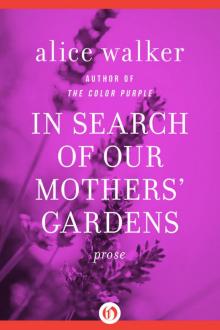 In Search of Our Mothers' Gardens: Prose
In Search of Our Mothers' Gardens: Prose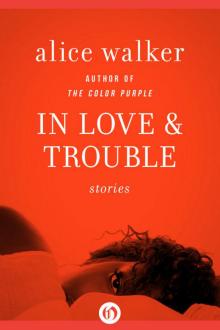 In Love and Trouble: Stories of Black Women: Stories of Black Women
In Love and Trouble: Stories of Black Women: Stories of Black Women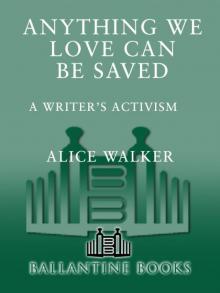 Anything We Love Can Be Saved
Anything We Love Can Be Saved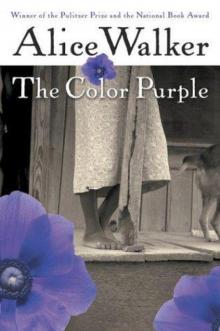 The Color Purple
The Color Purple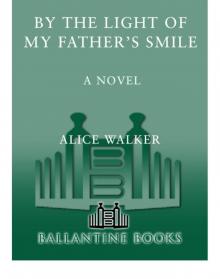 By the Light of My Father's Smile
By the Light of My Father's Smile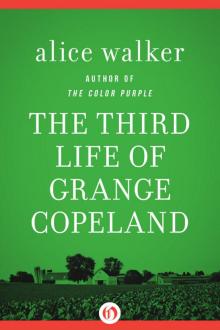 The Third Life of Grange Copeland
The Third Life of Grange Copeland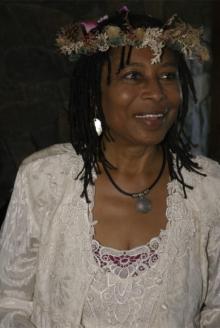 You Can't Keep a Good Woman Down
You Can't Keep a Good Woman Down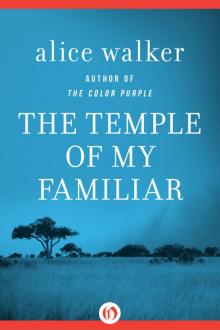 The Temple of My Familiar
The Temple of My Familiar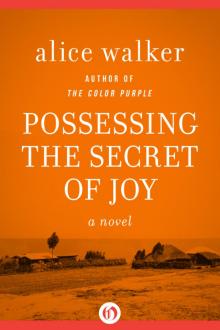 Possessing the Secret of Joy
Possessing the Secret of Joy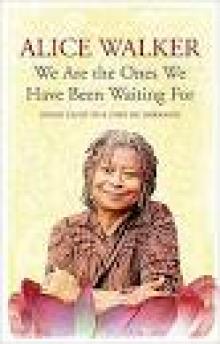 We Are the Ones We Have Been Waiting For
We Are the Ones We Have Been Waiting For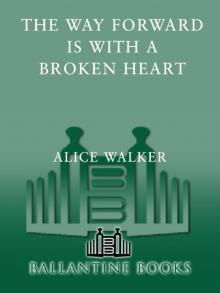 The Way Forward Is With a Broken Heart
The Way Forward Is With a Broken Heart Meridian
Meridian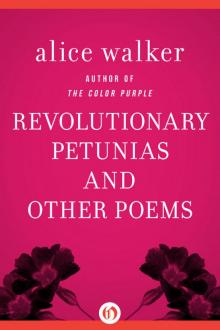 Revolutionary Petunias
Revolutionary Petunias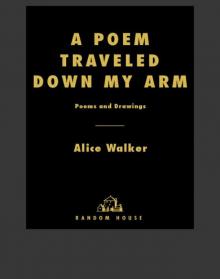 A Poem Traveled Down My Arm
A Poem Traveled Down My Arm Once
Once Horses Make a Landscape Look More Beautiful
Horses Make a Landscape Look More Beautiful Living by the Word
Living by the Word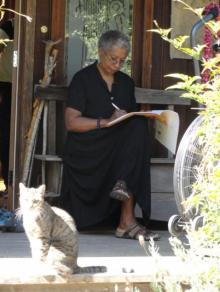 In Love and Trouble
In Love and Trouble The Color Purple Collection
The Color Purple Collection Now Is the Time to Open Your Heart
Now Is the Time to Open Your Heart Color Purple Collection
Color Purple Collection Taking the Arrow Out of the Heart
Taking the Arrow Out of the Heart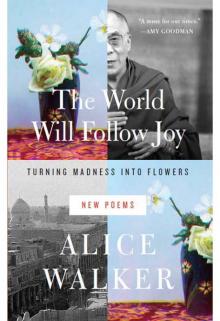 The World Will Follow Joy
The World Will Follow Joy Meridian (1976)
Meridian (1976) Absolute Trust in the Goodness of the Earth
Absolute Trust in the Goodness of the Earth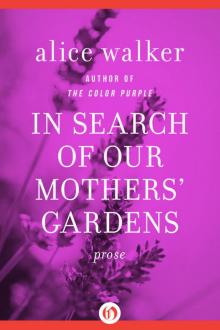 In Search of Our Mothers' Gardens
In Search of Our Mothers' Gardens